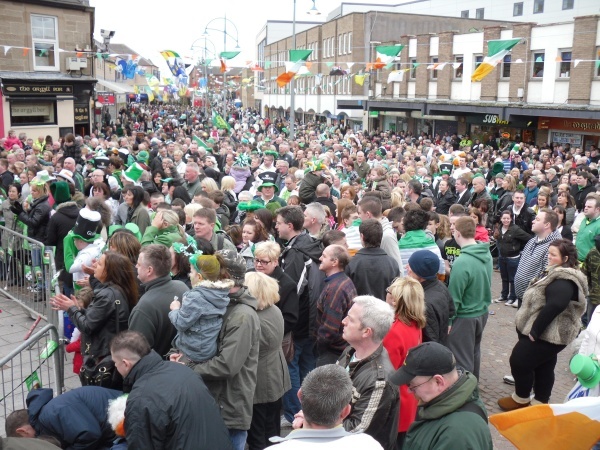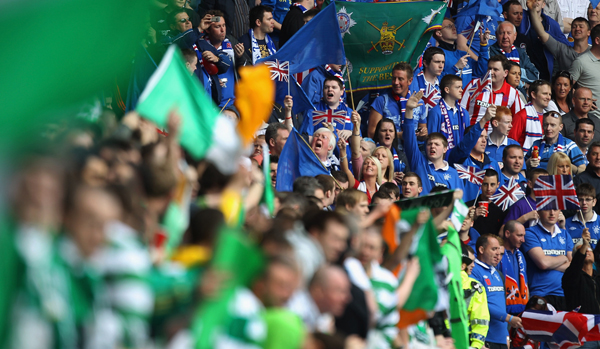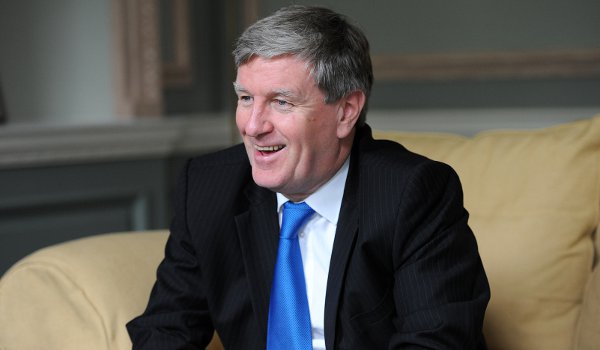WITH 60,000 citizens on the books, an on-going battle against Sectarianism to fight and an independence referendum due in September, its set to be a busy year for Ireland’s Scottish office.
For the diplomat tasked with overseeing its work, plans are already underway to make the best of the challenging months ahead.
The Irish Post spoke to Pat Bourne, Ireland’s Consul General to Scotland, to find out more about his role and priorities for 2014.
What’s the background to Ireland’s Consulate General in Scotland?
Ireland has had a Consulate here since 1999. It’s a child of the Good Friday Agreement and the British devolution moves.
The nice point is that our current Irish Ambassador to Britain Dan Mulhall was actually the first Irish Consul General in Scotland, and held the post from 1999 - 2003.
So he has come full spiral really, moving upwards to the Embassy in London, and that makes my job so much easier as the Ambassador understands Scotland so well.
As Consul General what are your responsibilities?
My responsibilities cover the full gamut of Irish diplomatic consular responsibilities, obviously the London Embassy is the primary office in Britain, and so I very closely align myself with the Ambassador’s priorities and try to be a part of that effort. But first and foremost we are a consulate.
We are here to respond to the needs of Irish citizens and often, quite sadly of course, we are interacting with them when they are having problems or are at their most vulnerable.
That underlines all the more the importance and urgency for us to be there and be effective and responsive to their needs. So we work with everyone, from those who are victims of attacks, or are affected by crime, to those who lose passports. I like to think we provide a very good service for Irish citizens in Scotland.
 Scotland's largest St Patrick's Festival in Coatbridge
Scotland's largest St Patrick's Festival in CoatbridgeHow many Irish people are currently living in Scotland?
The most recent Census figures say the number of Irish-born living in Scotland is just under 60,000, but that tells you only a fraction of the story.
The reality is so many Scottish people are of Irish descent and you have had this two way migration between Scotland and Ireland over the centuries. So it’s very difficult to get a percentage of the number of Scottish people who might have some Irish affiliation or attachment, but certainly it’s huge - very large and very overwhelming.
It’s particularly visible in Glasgow and obviously in terms of gravitational pull to a visibly Irish institution; it is evident in supporters of the Celtic Football Club. Coatbridge also is a wonderful place with the largest St Patrick’s Day Festival in Scotland and a significant Irish population.
But even here in Edinburgh there are significant numbers of Irish people, they are a bit more dispersed but they are here and there are even steps being taken to get an Edinburgh ‘Festival of Ireland’ up and running.
What’s your experience of anti-Irish sectarianism in Scotland?
One of the things I think is very important, and it’s a serious issue, is the lingering and continuing legacy of sectarianism and anti-Irishness in Scotland.
I would not want to overstate the scale of that or the frequency in which that comes up but it is an issue, and the Irish community in Britain and Scotland will have noted some of the incidents over the past few months.
The appalling case of British Soldiers seemingly engaging in anti-Irish sectarian singing and chanting on video was quite disturbing. And the fact that no action seems to have been taken, is quite disappointing.
The eviction from a taxi cab of two young Irish people, apparently just for no other reason than the fact that they were speaking the Irish language, is again quite disturbing.
I wouldn’t draw links between these events or say there is a pattern here, but even a single incident like this is just not acceptable in a modern democratic country that serves human rights, standards and the norms in the 21st century.
These are difficult problems to solve and obviously the British government and Scottish authorities are taking things very seriously, and a lot of progress has been made over the years, but even a single incident is not really acceptable.
That is something I am happy to highlight as appropriate to stimulate a debate and maybe have a conversation among the Irish community about it. Sectarianism is a diminishing phenomenon, but we should not be complacent or satisfied until it’s completely consigned to history and wiped out altogether.
That’s one area I really would like to make progress on in the years while I am here.
 "Anti-Irishness" is a serious issue in Scotland
"Anti-Irishness" is a serious issue in ScotlandHow have you been preparing for Scotland’s Independence Referendum? (Due in September 2014)
A very large part of my focus has been on trying to understand what’s going on in the Scottish political situation.
So I’ve been making contact with people - talking to politicians, public servants, academics and journalists - to try to understand what is happening in the independence debate and of course what implications that might have for Ireland depending on the different outcome scenarios.
As a Consulate we continue to take a position that is silent and neutral on the Scottish Independence debate, and I think that is appropriate, but I always say that silence should not be mistaken for indifference or apathy. This referendum is very important for us and we do monitor it and analyse it very closely. It’s an important part of the work we do.
What other plans do you have for 2014?
Another really big part of the work we do here relates to the economic relationship between Ireland and Britain and trying to promote that.
The lead is taken there by the Embassy in London and the two Governments of course, and we don’t disaggregate the figures, so we don’t have very precise statistics or data regarding how much of the trade is originating in Scotland, but clearly it’s there.
There are a lot of Irish companies that are active in Scotland, there are Scottish headquartered companies with investment in Ireland and we have a very big tourism exchange between the two countries due to the huge Irish diaspora in Scotland and the connections with Donegal and indeed all parts of Ireland.
With all of that there is great potential for expanding trade between Scotland and Ireland so I am out there shaking the trees and beating the bushes to highlight these opportunities, while working very closely with state agencies, such as Tourism Ireland, Enterprise Ireland and Culture Ireland.
 "From Dan Mulhall to everyone who has been here since, there has been an extraordinary journey"
"From Dan Mulhall to everyone who has been here since, there has been an extraordinary journey"What would you like to achieve during your four year term in Scotland?
I have limited resources here, so will not set out an ambitious menu that I won’t be able to achieve or live up to. Also, from Dan Mulhall to everyone who has been here since, there has been an extraordinary journey here, as well as in the more general relations between Britain and Ireland.
To some extent I feel a little aggrieved that I arrived here when all the big breakthroughs have been achieved, but it also means we have a great thing to look forward to in April, in the first State visit by an Irish president to Britain.
But for me in the in the next four years I would like to see Scotland much more on the map for Irish business, for Irish exporters and Irish industry. I think there is clearly a very strong focus on Britain, which is Ireland’s most important market in every way, but the focus does tend to be dominated by London.
London is a great global city but I do think and would argue that for some companies, sectors and niches Scotland is a more natural and maybe more advantageous entry point for them.
Ultimately this is a great time to be positioned in Scotland, where heads are up again economically, culturally and in everything else. It’s an interesting time politically, we are on the upslope in terms of economy and trade and there is a vibrancy in terms of Irish culture and community, so I am looking forward to being a part of it.
Pat Bourne is Ireland’s Consul General to Scotland. Now based in Edinburgh, the Dublin native is married with two daughters, who are currently back home in Ireland.
His wife will join him in Scotland in the autumn, for the remainder of this four-year term.
He previously held diplomatic responsibilities for Africa in Dublin and his last overseas posting was in India.
Prior to this he has held postings in Australia, Denmark and the Middle East.

